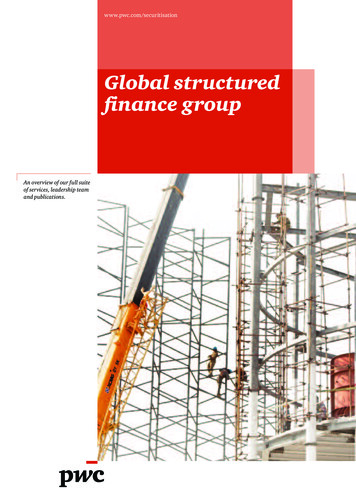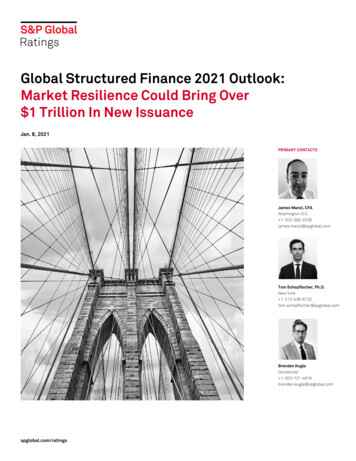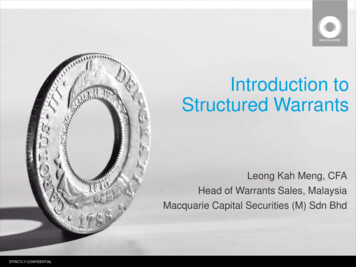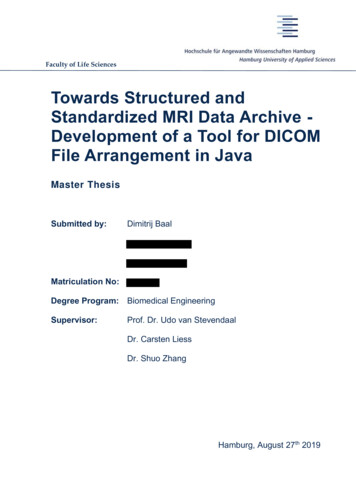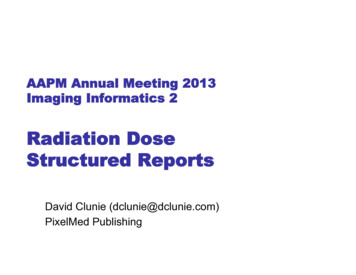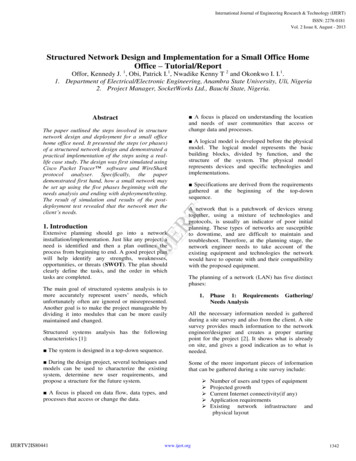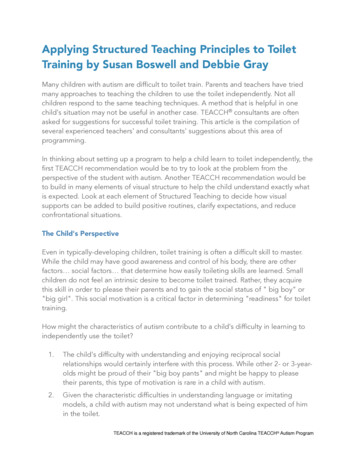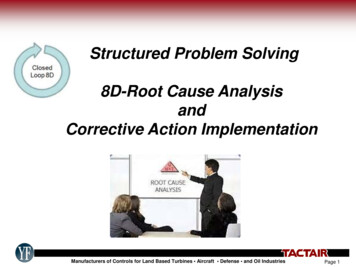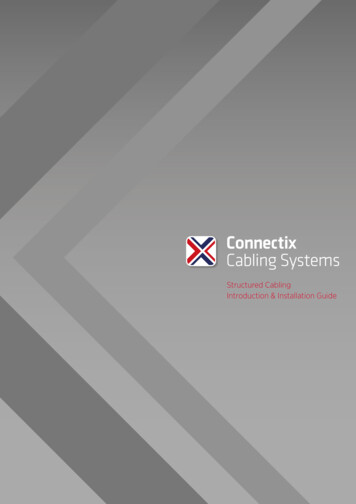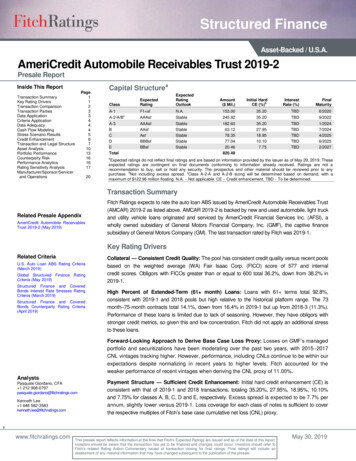
Transcription
Structured FinanceAsset-Backed / U.S.A.AmeriCredit Automobile Receivables Trust 2019-2Presale ReportInside This ReportTransaction SummaryKey Rating DriversTransaction ComparisonTransaction PartiesData ApplicationCriteria ApplicationData AdequacyCash Flow ModelingStress Scenario ResultsCredit EnhancementTransaction and Legal StructureAsset AnalysisPortfolio PerformanceCounterparty RiskPerformance AnalyticsRating Sensitivity AnalysisManufacturer/Sponsor/Servicerand OperationsPage11233444567101316161720Capital A-1F1 ount( Mil.)Initial HardbCE (%)InterestRate pected ratings do not reflect final ratings and are based on information provided by the issuer as of May 29, 2019. Theseexpected ratings are contingent on final documents conforming to information already received. Ratings are not arecommendation to buy, sell or hold any security. The prospectus and other material should be reviewed prior to anypurchase. bNot including excess spread. cClass A-2-A and A-2-B sizing will be determined based on demand, with amaximum of 122.96 million floating. N.A. Not applicable. CE Credit enhancement. TBD To be determined.Transaction SummaryRelated Presale AppendixAmeriCredit Automobile ReceivablesTrust 2019-2 (May 2019)Fitch Ratings expects to rate the auto loan ABS issued by AmeriCredit Automobile Receivables Trust(AMCAR) 2019-2 as listed above. AMCAR 2019-2 is backed by new and used automobile, light truckand utility vehicle loans originated and serviced by AmeriCredit Financial Services Inc. (AFSI), awholly owned subsidiary of General Motors Financial Company, Inc. (GMF), the captive financesubsidiary of General Motors Company (GM). The last transaction rated by Fitch was 2019-1.Key Rating DriversRelated CriteriaU.S. Auto Loan ABS Rating Criteria(March 2019)Global Structured Finance RatingCriteria (May 2019)Structured Finance and CoveredBonds Interest Rate Stresses RatingCriteria (March 2019)Structured Finance and CoveredBonds Counterparty Rating Criteria(April 2019)Collateral — Consistent Credit Quality: The pool has consistent credit quality versus recent poolsbased on the weighted average (WA) Fair Isaac Corp. (FICO) score of 577 and internalcredit scores. Obligors with FICOs greater than or equal to 600 total 36.2%, down from 38.2% in2019-1.High Percent of Extended-Term (61 month) Loans: Loans with 61 terms total 92.8%,consistent with 2019-1 and 2018 pools but high relative to the historical platform range. The 73month–75-month contracts total 14.1%, down from 16.4% in 2019-1 but up from 2018-3 (11.3%).Performance of these loans is limited due to lack of seasoning. However, they have obligors withstronger credit metrics, so given this and low concentration, Fitch did not apply an additional stressto these loans.Forward-Looking Approach to Derive Base Case Loss Proxy: Losses on GMF’s managedportfolio and securitizations have been moderating over the past two years, with 2015–2017CNL vintages tracking higher. However, performance, including CNLs continue to be within ourexpectations despite normalizing in recent years to higher levels. Fitch accounted for theweaker performance of recent vintages when deriving the CNL proxy of 11.00%.AnalystsPasquale Giordano, CFA 1 212 908-0797pasquale.giordano@fitchratings.comKenneth Lee 1 646 582-3583kenneth.lee@fitchratings.comPayment Structure — Sufficient Credit Enhancement: Initial hard credit enhancement (CE) isconsistent with that of 2019-1 and 2018 transactions, totaling 35.20%, 27.95%, 18.95%, 10.10%and 7.75% for classes A, B, C, D and E, respectively. Excess spread is expected to be 7.7% perannum, slightly lower versus 2019-1. Loss coverage for each class of notes is sufficient to coverthe respective multiples of Fitch’s base case cumulative net loss (CNL) proxy.8www.fitchratings.comThis presale report reflects information at the time that Fitch’s Expected Ratings are issued and as of the date of this report.Investors should be aware that the transaction has yet to be finalized and changes could occur. Investors should refer toFitch’s related Rating Action Commentary issued at transaction closing for final ratings. Final ratings will include anassessment of any material information that may have changed subsequent to the publication of the presale.May 30, 2019
Structured FinanceAdditional Rating DriversSeller/Servicer Operational Review — Consistent Origination/Underwriting/Servicing: Fitchrates GM and GMF’s ‘BBB/F2’, Rating Outlook Stable. GMF demonstrates adequate abilities asoriginator, underwriter and servicer, as evidenced by historical portfolio and securitizationperformance. Fitch deems GMF capable of adequately servicing this series.Legal Structure Integrity: The legal structure of the transaction should provide that abankruptcy of GMF would not impair the timeliness of payments on the securities.Transaction ComparisonAMCAR 2019-2 870,551,703 20,60642,247SDART 2019-2 1,166,174,584 20,37957,224CPSART 2019-B 142,974,000 17,0098,406WA APR (%)WA LTV (%)WA FICO Score13.0%108.0%57715.5%106.7%60018.9%114.2%560WA Original Term (Mos.)WA Remaining Term (Mos.)Seasoning (Mos.)Loans 60 Mos. OT (%)Loans 72 Mos. OT New Vehicles (%)Used Vehicles (%)53.69%46.31%41.00%59.00%20.80%79.20%18.27% (TX)6.93% (CA)6.68% (FL)5.71% (OH)4.55% (IL)16.32% (TX)10.09% (FL)7.49% (CA)6.88% (PA)5.03% (GA)13.21% (CA)9.93% (OH)7.89% (GA)6.15% (NC)5.79% %15.00%6.50%58.50%41.80%27.60%15.50%4.60%F1 sfAAAsfAAAsfAAsfAsfBBBsfBBsfF1 .00%NRAggregate Balance ( )Average Current Principal Balance ( )Number of LoansGeographic Distribution (%)State 1State 2State 3State 4State 5Credit Enhancement (%)Class A (Initial)Class B (Initial)Class C (Initial)Class D (Initial)Class E (Initial)Fitch RatingsClass A-1aClass A-2aClass A-3aClass BaClass CaClass DaClass EaFitch CNL Proxy (%)aRatings are expected for AMCAR 2019-2. APR – Annual percentage rate. LTV – Loan to value ratio. NR – Not rated byFitch. SDART – Santander Drive Auto Receivables Trust. CPSART – CPS Auto Receivables Trust.Source: Fitch Ratings, GMF, Santander Consumer USA and Consumer Portfolio Services, Inc.AmeriCredit Automobile Receivables Trust 2019-2May 30, 20192
Structured FinanceTransaction PartiesRoleNameFitch RatingIssuerAmeriCredit Automobile Receivables Trust 2019-2Not RatedDepositorAFS SenSub Corp.Not RatedSponsor/ServicerAmeriCredit Financial Services, Inc.Not RatedParentGeneral Motors Financial Company, Inc.BBB/F2; Rating Outlook StableCorporate ParentGeneral Motors CompanyBBB; Rating Outlook StableTrustee/Trust Collateral AgentThe Bank of New York MellonAA/F1 ; Rating Outlook StableOwner TrusteeAsset Representations ReviewWilmington Trust CompanyClayton Fixed Income Services, Inc.A/F1; Rating Outlook StableNot RatedUnderwriter(s)BarclaysA/F1; Rating Watch NegativeBNP ParibasA /F1; Rating Outlook StableGoldman Sachs & Co. LLCA/F1; Rating Outlook StableWells Fargo SecuritiesA /F1; Rating Outlook StableSource: Fitch Ratings, AMCAR 2019-2.Data ApplicationAMCAR 2019-2Net Loss Proxy (%)Subprime Auto Loan ABSAsset PerformanceRatings PerformanceSource: Fitch Ratings.11.00OutlooksStable/WeakeningStableGMF provided over 13 years of static net loss data for its retail loan portfolio. Fitch analyzedthe monthly static pool data to determine the base case loss estimate for this series. Static pooldata received were stratified into subsegments based on the following collateral characteristics: internal credit score; and internal credit score and term.To derive a base case loss estimate, Fitch analyzed the provided static pool data listed above aswell as performance data from previous securitizations. Fitch utilized GMF’s internal credit scoringperformance by term data as a base to extrapolate and derive the loss proxy. GMF’s internal creditscore incorporates FICO scoring and additional credit quality attributes, which may not be capturedby the FICO score alone.Historical loss timing curves and recent performance for each of the static pools were used toextrapolate CNL expectations, which varied for certain characteristics of the pool. Expected lossesfor these characteristics were weighted according to the composition of the series pool to yield aCNL expectation for the transaction. Recoveries were estimated using GMF recovery data from itsportfolio and securitizations.Consistent with 2019-1, to account for the slightly higher losses of recent managed portfolio vintagesand AMCAR securitizations, Fitch incorporated the 2014 2015 extrapolations in addition to thestressed 2006 2009 period in deriving our loss proxy. Recent vintages are also included to capturethe current credit cycle and wholesale vehicle market conditions.Using the aforementioned data and loss analysis, Fitch’s base case CNL proxy for the 2019-2 poolis 11.00%, up from 10.75% in 2019-1 and 10.50% in 2018-2 and 2018-1 due to shifts in the creditprofile. This is still down from 11.20% in 2017-2 and 11.10% in 2017-1 due to the stronger creditprofile of recent AMCAR pools relative to older deals. In particular, these transactions have a notablyhigher concentration of borrowers with internal scores 255 and greater.Risk factors that may influence performance include national or regional economic downturns,wholesale vehicle market weakness that result in low vehicle recovery rates, a GM or GMFbankruptcy, poor servicing or a servicer transfer.AmeriCredit Automobile Receivables Trust 2019-2May 30, 20193
Structured FinanceCriteria ApplicationFitch’s base case CNL derivation, modeling assumptions and loss multiples for thetransaction’s ratings are consistent with the auto loan rating criteria published on our website.Fitch’s criteria report titled “U.S. Auto Loan ABS Rating Criteria,” dated March 2019 (availableat www.fitchratings.com), was used to analyze this transaction. Additional criteria applicable tothis analysis include “Global Structured Finance Rating Criteria,” dated May 2019, “StructuredFinance and Covered Bonds Interest Rate Stresses Rating Criteria,” dated March 2019, and“Structured Finance and Covered Bonds Counterparty Rating Criteria,” dated April 2019.Subprime auto loan ABS multiples were applied, consistent with ranges in the criteria.Data AdequacyThe data provided by GMF were deemed adequate and consistent with prior transactions;therefore, no adjustments were applied to this series. A portion of the data provided by GMFwas not, to Fitch’s knowledge, audited by an internationally recognized accounting firm.Fitch compared the vintage net loss data with the vintage, securitization and managed portfolio,net loss data provided in the transaction’s prospectus. Fitch believes the CNL proxy derivedutilizing this net loss data to be reasonable compared with data provided in the prospectus; assuch, no adjustments were made to Fitch’s analysis.Additionally, Fitch relied on detailed stratifications of the transaction’s collateral pool toascertain characteristics of the pool that could affect transaction performance. The detailedstratifications include some that are not in the series prospectus and, to Fitch’s knowledge, notaudited by a third party. For those stratifications in the series prospectus that GMF provided,Fitch compared the stratifications with those in the series prospectus. The stratificationsprovided in the series’ prospectus were substantively the same as those provided to Fitch. In areview of each set of stratifications, Fitch found that they were consistent; as such, noadjustments were made to Fitch’s analysis.Fitch was provided with Form ABS Due Diligence-15E (Form 15E) as prepared by Ernst &Young LLP. The third-party due diligence described in Form 15E focused on a comparison andrecomputation of certain characteristics with respect to 185 randomly selected sample loancontracts. Fitch considered this information in its analysis, and the findings did not have anyimpact on our analysis. A copy of the ABS Due Diligence Form-15E received by Fitch inconnection with this transaction may be obtained through the link contained on the bottom ofthe related rating action commentary.Form ABS-EE contains an asset-level data file with detailed information for each receivable inthe pool for this series. Fitch has not yet reviewed Form ABS-EE; however, Fitch expects thatdata in Form ABS-EE will be substantively the same as the information provided on thereceivables in the prospectus. Fitch will comment if the subsequent review of the asset-levelinformation affects our analysis.Cash Flow ModelingFitch used its internal auto loan ABS cash flow model to simulate stresses to the transaction anddetermine the sufficiency of available enhancement for each class of notes. Fitch customized itscash flow model to replicate the flow of funds outlined in the transaction and used replines in cashflow modeling based on the collateral compositions and stratifications.AmeriCredit Automobile Receivables Trust 2019-2May 30, 20194
Structured FinanceA delinquent interest stress of 1.00% was applied to account for uncollected collateral interestarising from delinquencies. Recovery and chargeoff lags of three months were included to addresstiming extensions between repossession, liquidation and receipt-of-sale proceeds. The servicing fee,totaling 2.25%, was modeled at the top of the waterfall. Prepayments were assumed at 1.00% ABS.Cumulative gross and net loss estimates were distributed over the life of the collateral pool, inaccordance with Fitch’s assessment of the historical loss speeds based on analysis of the data forGMF’s portfolio segments and prior securitizations. Four-year loss curves of 35%/35%/20%/10%(the base loss curve for 2019-2), a mid-loaded curve of 20%/40%/30%/10% and a back-loadedcurve of 20%/25%/30%/25% were used to evaluate the impact of different timing scenarios.Fitch’s One Month LIBOR Interest Rate Up %)1210864201611 16 21 26 31 36 41 46 51 56 61 66 71 76 81 86 91 96 101 106 111 116 121Source: Fitch Ratings.Interest Rate StressesThis transaction may include a floating-rate class A-2-B note, while the underlying loans in the poolpay interest at a fixed rate, and there is no interest rate hedge in place to mitigate the risk of risinginterest rates. Accordingly, Fitch stressed assumed interest rates upward given that the primary risksuch a structure poses to the transaction is increased interest rates driving liability coupons upwardwithout corresponding increases on the asset yield. Because lower interest rates would have apositive impact on the transaction, a down interest rate scenario was deemed unnecessary.Consistent with Fitch’s “Structured Finance and Covered Bonds Interest Rate Stresses RatingCriteria,” dated March 2019, and based on the structure, Fitch focused on the ‘AAAsf’, ‘AAsf’,‘Asf’, ‘BBBsf’ and ‘BBsf’ up interest rate scenarios.Stress Scenario ResultsUnder the stress scenarios, full payments of interest and principal, in accordance with the terms ofthe underlying legal documents, were made to the respective classes of notes. Under Fitch’sprimary case cash flow scenario, class A notes were able to withstand approximately 40.9% in CNLbefore incurring losses on principal or interest. Classes B, C, D and E could withstand approximately35.3%, 28.1%, 21.4% and 19.8% in CNL, respectively.The loss coverage levels produced for the class A, B, C, D and E notes exceed Fitch’srecommended multiple levels (3.25x for AAAsf, 2.75x for AAsf, 2.25x for Asf, 1.75x for BBBsfand 1.50x for BBsf) under the primary loss timing scenario. Fitch also ran a mid- and backloaded scenario to stress the pool against different timing scenarios as a sensitivity analysis.Under both timing scenarios, the loss coverage levels were sufficient for all classes.AmeriCredit Automobile Receivables Trust 2019-2May 30, 20195
Structured FinanceSample Stress Scenario ResultsAssets (%)Prepayments(ABS)Loss Speed (%)Year 1Year 2Year 3Year 4Recovery RateRecoveryLag (Months)ChargeoffLag (Months)Liabilities (%)AnnualServicingDelinquencyStressBondCoupon (Initial)aFront (Primary Break-EvenResultsClass A Class B Class C Class D Class E Class A Class B Class C Class D Class E Class A Class B Class C Class D Class ECollateral LossesCovered 629.019.916.6Loss CoverageMultiple 42.641.811.51F1 sf/F1 sf/F1 sf/Expected Rating fAsfBBBsfBBsfaBased on preliminary pricing estimates for the offered notes.Source: Fitch Ratings.Credit EnhancementThe cash flow distribution for 2019-2 follows straight-sequential priority of payments, consistent withprior transactions. Hard CE is unchanged from the prior nine transactions and totals 35.20%,27.95%, 18.95%, 10.10% and 7.75% for classes A, B, C, D and E, respectively.SubordinationClass A note subordination totals 27.45%, class B 20.20%, class C 11.20%, and class D 2.35%,unchanged since 2016-2.Reserve AccountThe nondeclining reserve account will be initially sized and maintained at 2.00% of the initial pool,unchanged from prior ation (OC) is initially 5.75% of the pool balance, growing to a target of 14.75% of theoutstanding pool balance (less the reserve requirement for the distribution period), consistent withthe prior eight transactions. OC will step down as the pool balance declines until the OC floor of0.50% of the initial collateral balance is reached.AmeriCredit Automobile Receivables Trust 2019-2May 30, 20196
Structured FinanceExcess SpreadThe initial excess spread is approximately 7.71% per annum, down from 7.93% in 2019-1, buthigher than 7.24% in 2018-3 (NR) and 7.08% in 2018-2. Based on the WA life to call of thenotes of 1.81 years, lifetime excess spread is expected to be approximately 13.92%.Credit Enhancement Comparison(%)Initial Hard CEClass AClass BClass CClass DClass EInitial OC (Initial Collateral)Target OC(Outstanding Collateral)aFloor OC (Initial Collateral)Reserve(Nondeclining Off Initial)Excess Spread P.A.bLifetime Excess SpreadFitch Base Case CNL 352.007.6513.39NR2.007.6513.84NRaLess the reserve account requirement. bWith the exception of 2019-2, as of closing. OC – Overcollateralization. P.A. – Per annum. CE – Credit enhancement. NR – Notrated.Source: Fitch Ratings.Transaction and Legal StructureInterest AllocationMonthly interest is allocated first among all the class A notes on a pro rata basis. Interest onthe class A-1 and A-2-B notes will be calculated based on a 360-day year consisting of actualdays. Class A-2-A, A-3, B, C, D and E notes will be calculated based on a 360-day yearconsisting of 12 30-day months. Interest on class B, C, D and E n
Fitch Ratings expects to rate the auto loan ABS issued by AmeriCredit Automobile Receivables Trust (AMCAR) 2019-2 as listed above. AMCAR 2019-2 is backed by new and used automobile, light truck and utility vehicle loans originated and serviced by
